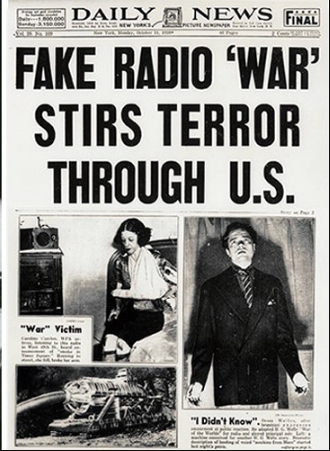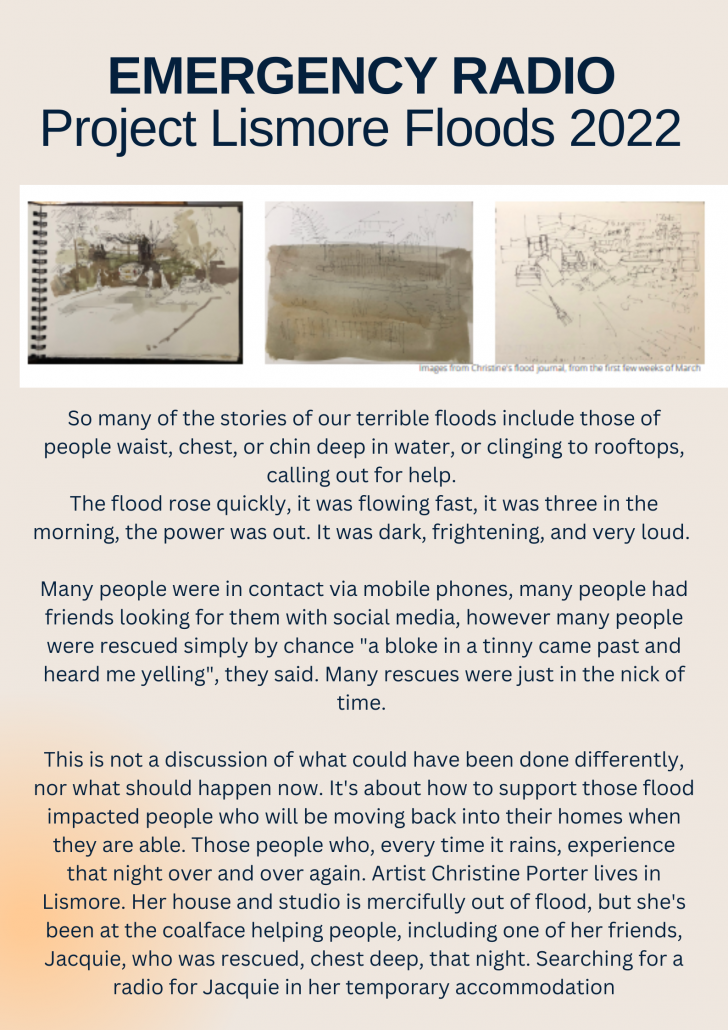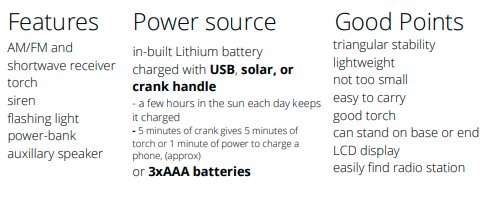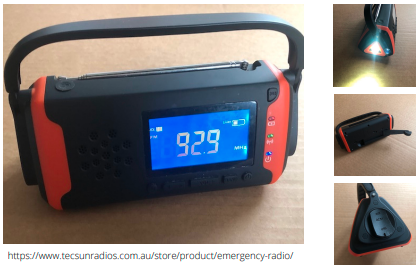
You may recall last year at Halloween, we invited you to listen to the original broadcast of “A Witch’s tale” If you have not heard that one yet, add it to your list. It’s a fantastic piece of radio drama history!
This Halloween, celebrate the spooky….. Turn your lights down low, light a candle and listen to this spooky 1938 radio production of the H. G. Wells’ classic sci-fi novel, The War of the Worlds.
The broadcast begins as a simulation of a regular evening radio broadcast featuring a weather report and music by “Ramon Raquello and his Orchestra” live from a downtown New York hotel ballroom, reminiscent of broadcasts at that time.
Suddenly, a couple of minutes int the broadcast, the music is interrupted by an emergency news flash as reports come in of strange explosions on Mars!
The music performance continues before there is another interruption- A Princeton based astronomy professor Richard Pierson is questioned about these “gas explosions” on Mars, but dismisses them. The music continues until news hits of a strange meteorite landing in “Grovers Mill, New Jersey”
This particular broadcast is said to have caught many radio listeners off guard, those tuning between program breaks on other channels, stumbling across this “breaking news” style of storytelling used during the first part of the show were incredibly alarmed on all Hallows Eve that year! Partly because this was a tense period of time just prior to World War II when radio was the main source of media and information.
Widespread outrage was expressed in the media, leading to an outcry against the broadcasters and calls for regulation by the FCC.
The very next morning a news conference was called, at which 23 year old Welles apologised.
The broadcast and subsequent publicity brought the 23-year-old Welles to the attention of the general public and gave him the reputation of an innovative storyteller and “trickster”

Do you remember the story of the War of The Worlds? We recommend listening to the broadcast, but also imagine it is 1938, you are tuning channels and you come across this broadcast! You couldn’t have pulled off this trick with the internet or TV, the fact that it was over airwaves made it all the more real.
Click here to listen to the original broadcast HERE
Courtesy of Internet archives. Archive.org
Another interesting pastime that we have noted on Youtube in recent years, is people searching for pirate radio stations on Halloween, a time popular for receiving these signals, which kind of adds to the creepiness of some of these pirate stations.
If you are in a neighbourhood that has many kids, be warned, Halloween is gaining popularity these days. You may just get some mini ghosts and ghouls at your door looking for lollies!
Little mischief minded kiddos are ready to play a trick if they receive no treat. If you do want to participate in Halloween and you have kids in the neighbourhood, be sure to add some orange streamers or an orange balloon to the front of your house and have your treats on hand.

We came across a story this month that reminded us of the importance of being educated in radio communication and a reminder of what a resourceful, knowledgeable, and helpful community amateur radio operators are.
On September 7, 2022, a boat named SV Nereida traveling from Cape Flattery, the northwesternmost point of the USA to San Francisco, California became disabled after 2 days of 35 knot winds and storms.
81 year old Jan Socrates, an experienced sailor who has sailed around the world without assistance, and in fact has been the oldest person to do so, found herself very low on power and her onboard radio equipment marginally operational. But her knowledge of amateur meant she knew how to get her message out to a community who could help!
Amateur operators in New Mexico, California, and Canada, and members of Group 7.155 heard her requests for assistance.
One such person who heard her request and in fact was able to contact Socrates on 40 metres was Gil Gray, N2GG. “Her power was extremely low, and she was unable to communicate on 14.300 MHz to notify the monitoring group on that frequency,” said Gray. “She needed help with wind and sea conditions, and tidal data for San Francisco Bay,” he added.
Q5 copy was almost impossible due to the low-power output on the HF radio which would typically be Q2 or Q3. Thankfully several software-defined radio (SDR) operators were on hand in California, Utah, and Maui, Hawaii, who were able to glean enough copy to understand her situation and answer questions for her navigation.
Another stroke of luck was that several of these radio operators were also experienced sailors and helped guide Socrates through periodic contact with weather and wind reports.
Their last contact was on Monday, September 12, at 11:00 AM (MSDT). By this time, Socrates was sailing with only the forward sail on her 38-foot sloop. Thankfully, a “following wind” kept her moving without a mainsail.
As the Golden Gate Bridge appeared within sight, Socrates was able to use the tidal information passed on by amateur radio operators to make it safely to Berkeley Marina in San Francisco Bay.
“I wouldn’t call it a rescue,” said Socrates, “just good amateur radio assistance — and I’m grateful for their help.”
This is actually one of 3 events in September in which amateur radio was able to provide emergency assistance.
If you would like to learn more about Jan Socrates’ travels, take a look at her Facebook page.
Do you know somebody who loves to travel and who would benefit from knowledge of shortwave? Send them this article, and indeed a link to this website as we have lots in interesting shortwave news, links, and resources, as well as the best range of shortwave radios available in Australia.
Adapted from the original article that can be found on https://www.arrl.org/news/

Image via AAP: Jason O’Brien ( abc.net.au)
As the Bureau Of Meteorology declares another La Niña, increasing flood risk for the third year in a row, we reflect on those affected by this weather pattern last year.
Something those in eastern Australia have been all too familiar with over the last two soaking La Niña summers.
According to Dr Margaret Cook, environmental historian and lecturer at the University of the Sunshine Coast and researcher at Griffith University. “The problem with a triple La Niña is that the ground is very wet already, our rivers are quite high, our creeks are full and our dams are quite full,””So we have less capacity to absorb this enormous amount of rain.”
It does not necessarily follow that this summer will definitely bring biblical floods.
But it doesn’t rule out the possibility of floods this summer.
During a La Niña, the atmospheric circulation across the tropical Pacific is set up so that warm waters to Australia’s north-east and strong trade winds pump moisture into the atmosphere along Australia’s east coast. When the right systems come along they can then tap into that moisture, bringing about heavy rains and flooding.
A situation all too familiar for those situated on the east coast of Australia.
Like many Australians, we wanted to find a useful way to help those that were affected by the floods.
Lismore resident Christine Porter created a fantastic initiative to distribute Emergency radios to the flood stricken Lismore and surrounding community.
Aptly named EMERGENCY RADIO Project Lismore Floods 2022.

Christine found the BEST Emergency Radio by Tecsun Radios, Sydney. She realised that, as well as it being a great AM/FM radio, its primary function for emergencies matched the emergency we’d just had. It’s a torch, lightweight, stable, not too small. Its lithium battery is charged by USB, an inbuilt solar panel, or its own crank handle. It can be used as a power-bank, will pick-up shortwave, but most importantly: it has a siren and flashing beacon.
After long discussions with the principal at Tecsun, and testing one herself, she believes something like this would have made a very real difference the night of the flood. Next time there may not be a bloke in a tinny going past at just the right time.
Her aim is to put one of these radios into as many single-person households returning to the flood zone as she can – especially for older or less-abled people. The river rose 2.4 metres (8 feet) higher than the highest flood on record, so the flood zone has spread into parts of suburban Lismore it never had before. Christine has ordered 50 radios, with an option for another 50 later in the year. Her plan is to contact groups or individuals outside the North Coast region to fundraise for the purchase of the radios, in order to spread the volunteer load, and give people a specific way to help. Tecsun has kindly offered a discount to support Christine.
Lismore is still broken; there is so much still to do. If you, or your organisation would like to contribute, Christine has set up a bank account to receive donations for the radios. She’ll send you a receipt and follow up info about how the project is going. If you’d like to send a card, or message to the recipient of your radio/s she’ll pass that on. It’s the small things as well as the grand gestures that we see making a difference. That night, in the rain and the noise, no-one would have imagined we’d all be still here knee-deep (waist, chest and chin deep) in worry so far into the future. Christine believes that the radio will save lives should an event like this happen again, but it will also reassure the traumatised that this time, if need be, someone will be able to hear them call out in the night.

If you would like to donate a radio to Christine, please contact us at: hello@tecsunradios.com.au for special pricing



